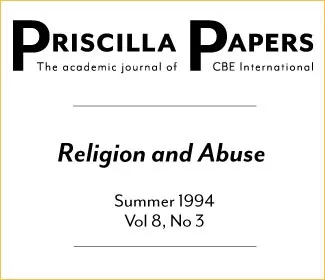When Desiree Washington charged that Mike Tyson had raped her, some Christians retorted that it was her fault for getting herself into the situation. To my horror, the Bible study group at our church was divided on the issue, and paradoxically most of the women support Mike Tyson (I later learned that one of the few women who remained silent was a rape victim herself). I was further horrified that some of the more vocal leaders in our denomination (the National Baptist Convention, U.S.A.) reiterated the same views; although some of us spoke out on behalf of Ms. Washington, it was those who favored Mr. Tyson who garnered the publicity.
But while blaming the victim may accord with some of the ethics of our culture, it does not accord with the Bible. It may be true that some rape victims could have taken better safety precautions, but inadequate safety precautions in no way merit rape. Further, even the best of safety precautions have not always prevented it, and lack of precaution may sometimes follow from virtuous innocence as easily as from carelessness.
Condemning a rape victim makes about as much sense as condemning a murder victim — none. In fact, I would venture to suggest that those who condemn the innocent (the rape victim, the incest victim, the abandoned spouse, etc.) stand under God’s judgment, as the Bible indicates (e.g., Exod. 23:7).
Rape in Israelite Law
Israelite law sometimes fell short of the ethics of the Kingdom, choosing to regulate rather than tolerate structural evil still too entrenched to be abolished outright (e.g., indentured servanthood). Sexual offenses, however, were viewed as unfaithfulness to one’s spouse, betrayal of one’s deepest covenant, and hence merited death.
Yet as strictly as Israelite law forbade sexual relations with someone to whom one was not married, the law was careful to point out that rape was a different, special case. Rape was not an act determined by mutual sinful consent, like premarital sex; rape was a sin imposed by one person on another, like murder or theft. The rape victim had no choice in her situation.
If an engaged woman was raped, the man who raped her was put to death for committing adultery against her impending marriage union (Deut. 22:25). She, however, was not to be punished, for as the Bible explicitly says, “there is no sin in her worthy of death, for just as a man rises against his neighbor and murders him, so is this case” (22:26). In fact, if no one else was present as a witness of her innocence but she was clearly penetrated, biblical law assumes her innocence without requiring witnesses (22:27); the burden of proof is not on her to prove that she did not consent.
Ancient Israelites’ usual chastity undoubtedly made for stronger marriages, but the cultural perspective on virginity that accompanied it posed a problem to rape victims. Most men choosing a wife for the first time wanted a woman who had never had intercourse before. The rape victim, like the divorcee or widow, had lost future proof of her virginity, and some men would have been tempted to view her as other than a virgin in a society where most potential spouses were virgins. Since she could prove the circumstances of the rape, she would not be subject to shame or penalties after marriage (Deut. 22:17), but it would still have been somewhat harder (though not impossible) for her to find a husband, just as it was for widows and divorcees. The man who had raped her had thus potentially deprived her of her future hopes, including financial security. (The Bible does not suggest that this situation is the Kingdom ideal; but Israelite civil law worked with people in the society in which they lived.)
To protect the woman placed in this situation, two options were provided. The first option was that the man had to marry her and support her financially all her life; although this could provide the woman permanent financial security, more rape victims probably preferred the second option. The second option, here assumed as self-evident but explicitly stated in Exod. 22:17, was that her father as legal guardian could exercise the right of refusal on her behalf, and demand instead sufficient monetary payment to cover her dowry. (Her father would normally have been her legal guardian in that society; as an unmarried virgin, she was a minor, since most girls were married in that culture by age 14.) If the Exodus text refers to a traditional dowry, it means the money she would take into a marriage with her to keep her financially secure if something happened to the marriage; at any rate, in that culture the money would probably ensure her a new husband. What is most significant for our point is that Exodus calls it a dowry “equal to that for virgins;” she was violated against her will, and therefore must be treated as a virgin would be.
The consequence of such a law would be to discourage rape. It sent a message to the man: Sex is an act of intimacy and is only proper in the context of a committed relationship. If you are going to have sex with someone, you must be prepared to support her for the rest of your life. If you force her against her will, you must not only be ready to support her, but also to do without the benefit of ever having her affections — to be ready for her and her father to exercise the right of refusal. This apparently kept rape rare in ancient Israel. Modern laws may not offer sufficient vindication for a rape victim, or demand sufficient restitution from her assailant, but the Bible leaves no question concerning whose side God is on.
An Example of Rape
Rape was never viewed lightly; as rare as rape was in ancient Israel, it was sometimes avenged by death. In Genesis 34, Shechem, a local Canaanite prince, raped Dinah the daughter of Jacob. Two of her brothers responded by not only killing Shechem, but by slaughtering every male in his city to prevent retaliation. Although this went too far, as Jacob pointed out, it illustrates the strong feelings some of Israel’s forebears had against rape.
But a more detailed story of rape itself is told with regard to the family of King David. His eldest son Amnon, heir to his throne by birth right, conceived a passion for his half-sister Tamar (2 Sam. 13:1-2). A friend helped Amnon plot against Tamar, who never suspected his reason for wanting to see her (13:3-10). Once he revealed his motives and asked for intercourse, she pled with him: If they engaged in premarital sex, she would forfeit her evidence of virginity and would thus be unable to marry later; better that Amnon should ask for her hand in marriage (13:11-13). But Amnon overpowered her by brute force (13:14), and once he had finished, he did what some sexually passionate aggressors do today: He lost all interest in her (13:15).
If Tamar was like most Israelite girls her age, one of her fondest dreams was of a happy marriage. Amnon had apparently ruined her dreams and potentially ruined her life in a single act of his own self-gratification (13:16); afterward he wanted nothing to do with her (13:17). In Tamar’s case, it appears that she was so discouraged that she gave up on intimacy altogether (13:20); Amnon had ruined her life. As the king’s daughter, she would have had many suitors, despite her rape; even in ancient Israel, Tamar’s future need not have been over. But unlike many rape victims, Tamar chose not to seek healing and not to hope again.
David was angry (13:21), but the text does not suggest that he severely punished Amnon for his act (cf. 1 Kings 1:6). It is thus not altogether surprising that Tamar’s brother Absalom decided to avenge his sister by having Amnon killed (13:28-29). Absalom turned out to be as bad as Amnon, but Amnon’s sin was the catalyst that allowed Absalom’s own evil to surface. All this trouble in David’s household reflected judgment for David’s sin with Bath-sheba (12:10-12).
This biblical account is horrifying and was meant to be horrifying; the sufferings reflected were judgment, but they were not judgment on Tamar. David was judged; Amnon was judged; finally Absalom was judged; but Tamar was innocent and was wounded by another person’s sin.
The only characteristic reported of Tamar that Amnon might have used to explain his sin was that she was “beautiful” (13:1; a characteristic usually irrelevant in rape), which is hardly provocation for an act of violence; the text nowhere implies any fault on her part. She cannot be reproached for lack of caution; the thought that her half-brother would treat her in this way had not even occurred to her. Indeed there was no reason for it to have occurred to her — she had never heard of it happening before (13:12). If it had happened before, no one had spoken out about it (cf. Absalom’s unfortunate request for her silence in 13:20).
Jewish teachers in the time of Jesus sometimes blamed men’s lust on the way women dressed or acted, but Jesus placed the blame for lust squarely on the man who did it (Matt. 5:28). Nowhere in the Bible is any guilt assigned to a rape victim, nor does anyone question whether she might have done something to have invited it
Conclusion
Anyone who attributes to the rapist anything less than all the blame for the rape is making up his or her own ideas, not reflecting those of the Bible. Whatever happened the night Desiree Washington was raped, the forensic evidence indicated plainly that she was raped, and Christian leaders who spoke against her owe her a serious apology. Although many Christian leaders also openly took her side, probably most said nothing, preferring to let injustice stand unattended. Those who remained silent did as King David apparently did (2 Sam. 13:21; cf. 1 Kings 1:6) — a silence that brought neither restitution to the victim nor repentance and healing to the rapist (13:28-29).
Watching a crime without lending help to the victim helps only the oppressor; subsequently refusing support to a victim in the name of neutrality likewise makes us an accomplice to the crime and reinforces the victimizer’s excuses. May we learn to value the ethics of Scripture above the ethics of our culture.





